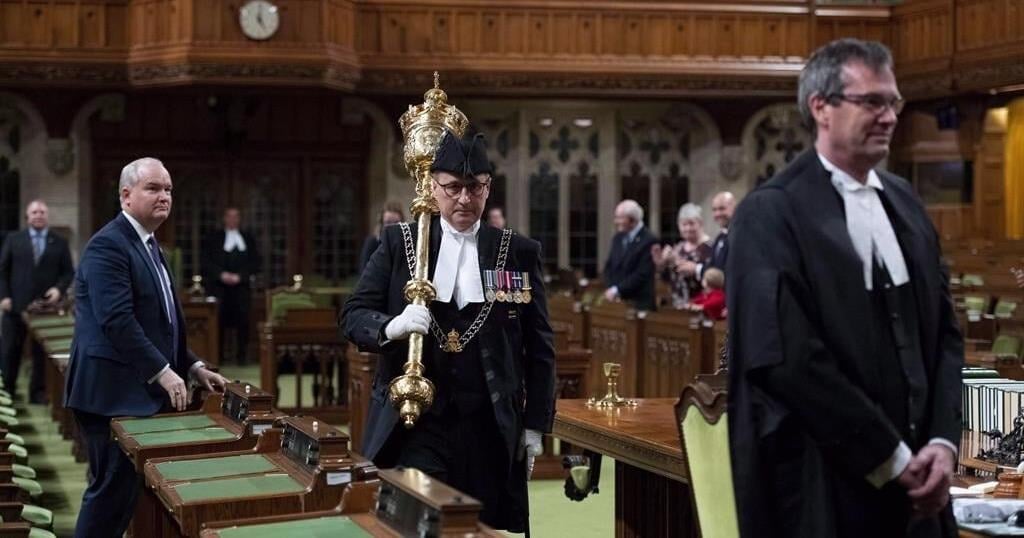OTTAWA – Canada’s chief electoral officer is playing down any suggestion that Elections Canada should directly administer political nomination or leadership contests.
In an interview with counsel for a federal inquiry into foreign interference, Stéphane Perrault pointed to the importance of parties controlling their own processes and indicated his agency lacks the resources to administer such contests in any event.
A summary of the August interview was made public at the inquiry Tuesday as Perrault appeared during a public hearing.
Elections Canada has suggested possible changes to safeguard nominations, including barring non-citizens from helping choose candidates, requiring parties to publish contest rules and explicitly outlawing behaviour such as voting more than once.
A report released in June by the National Security and Intelligence Committee of Parliamentarians expressed concern about how easily foreign actors can take advantage of loopholes and vulnerabilities to support preferred candidates.
However, representatives of some parties have told the federal commission of inquiry that such changes may be unwelcome, difficult to implement or counterproductive.
In the August interview with the commission, Perrault noted Elections Canada is a “centralized organization that springs into life in electoral districts across Canada when an election is called,” the summary says.
“It does not have the local structures or resources to engage in the ongoing type of operations that would be required to administer nomination and leadership contests across the country.”
Perrault noted that in Canada these contests can occur at any time, including during an election period. “The fact that non-fixed date elections can occur, as well as the existence of byelections, adds an additional level of complexity,” the summary says.
Perrault said that, to his knowledge, no electoral authority in the world with a comparable system administers nomination contests for political parties.
“Mr. Perrault recalled the importance of party autonomy, and the important value of permitting political parties to establish their own rules and procedures for selecting their leaders and candidates.”
He emphasized, however, that just because Elections Canada should not itself administer nomination and leadership contests “did not mean that there should not be additional rules to reinforce the integrity of these contests,” the summary adds.
Perrault indicated that Elections Canada had not yet finalized its recommendations.
The inquiry also delved Tuesday into a cyberattack directed at parliamentarians.
Senate officials say they were told in January 2021 about phishing emails targeting parliamentary accounts — attacks that were later attributed to hackers acting on behalf of Beijing.
Some of the emails made it through firewalls and landed in senators’ email inboxes, but no one opened the messages and the attackers did not gain access to information on Senate servers, the officials say.
They described the chain of events in an interview earlier this month with inquiry counsel. A summary of the conversation was presented Tuesday during inquiry hearings.
The officials said senators’ offices were immediately contacted to ensure any emails were destroyed, and the upper chamber’s information services directorate did a search of the Senate database to check that emails were deleted.
It emerged earlier this year that some MPs and senators faced cyberattacks from the hackers because of their involvement with the Inter-Parliamentary Alliance on China, which pushes for accountability from Beijing.
Early on, however, the Senate’s information services directorate was not aware the attack might have been conducted by Chinese hackers.
In any event, the Senate officials told the commission, knowing the source of the attack earlier would not have changed the directorate’s prompt response.
“We treat all these threats seriously, and we act quickly,” David Vatcher, director of Senate information services, testified at the inquiry Tuesday.
Vatcher said the number of attacks linked to foreign states is increasing but represents a minority of the overall attacks the upper chamber faces.
However, he said, the “geopolitical climate is very tense, and it would be crazy to think that these attacks are not going to continue increasing in number and in level of sophistication.”
Benoit Dicaire, a House of Commons official responsible for information technology, told the inquiry that phishing emails intended for eight MPs were quarantined by a security feature and never reached the members.
There are indications that some MPs’ personal addresses received the messages, but these accounts are beyond House of Commons jurisdiction.
This report by The Canadian Press was first published Sept. 24, 2024.

























